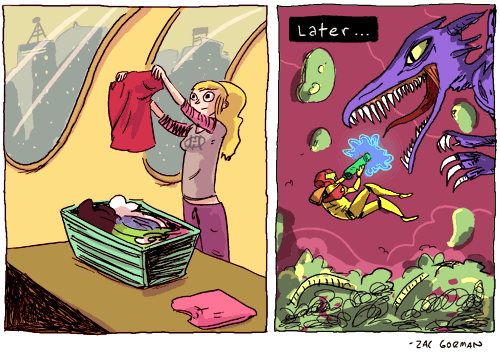Today in Indie Comics: Zac Gorman’s Magical Game Time
We Can Be Heroes

Ever wonder what’s going through the mind of your favorite video game characters once the console is off? Curious how the heroes you love spend their downtime between boss battles? Zac Gorman‘s gorgeous animated webcomic series Magical Game Time explores exactly those thoughts. The art’s use of texture and muted colors create a perfect isolated and self-reflective feel to the comic, which explores the inner lives of some of gamedom’s most iconic heroes as well as sharing the artist’s own musings on the way that video games, their stories, and their characters affect the lives of the players.
What makes Gorman’s Magical Game Time series different from the millions of other video game parody comics out there (which are also great in their own ways—Kevin Bolk‘s It Sucks to Be Weegie!, Katie Tiedrich‘s Awkward Zombie, etc.) is that it’s not all about the punchline. Instead of laughs and sitcom-style humor, many of Magical Game Time‘s strips explore deeper themes of motive and purpose, impermanence, and finding hope in places of despair. In exploring the quieter and more thoughtful side of video games, the comic gives tribute to the ways that the medium and these familiar iconic faces can inspire us in our own softer moments.
One of the especially enjoyable ways the series does this is by sometimes using its uniquely quiet tone to give voice to the inner life of the female characters of video games, those whose voices and strengths might not get as much of a chance to shine in the game’s main storyline. For every Samus Aran and Lara Croft, whose indomitable spirit and character we get to know personally through the game play, there are plenty of Zeldas and Aeriths whose points of view aren’t explored as deeply as those of the protagonist. Since Magical Game Time makes a point to look at video games from a different angle, these secondary and side characters get a chance to bring their own philosophies and observations to the world and story they live in.
The step off-center and the chance to get inside the head of characters whom we wouldn’t normally means a chance to explore and question the ways that the original story sets up its motifs and ideas. Magical Game Time uses this shift in perspective to make the reader reconsider what they know about characters or stories, to expand their perception. What does the disconnect of seeing stalwart soldier Samus domestically playing with her cat and drinking tea before taking on Ridley say about the nature of a character’s strength? What takes more courage: fighting monsters or keeping a good heart and staying hopeful when everything around you goes wrong?
The desire to explore alternate interpretations of stories that mean a lot to us isn’t new—especially not in geek culture. (See also: constant superhero movie reboots and alternate comic continuities.) Still, Gorman’s art does a great job of capturing these alternate perspectives in a wistful, thoughtful, and touching way. It’s a nice way to pay homage to the video game medium that recognizes the impact these games can have on those who play them.
Magical Game Time updates erratically once or twice a month, and you can buy related prints, pins, posters, apparel, and a published comic collection at the site’s store.
Alana is a freelance writer and editor who loves reading and supporting small-press and self-publishing artists and writers. She’d love to hear your indie recommendations at alanamancuso.com or talk shop with you via @AlanaMancuso on Twitter.
Are you following The Mary Sue on Twitter, Facebook, Tumblr, Pinterest, & Google +?
Have a tip we should know? tips@themarysue.com